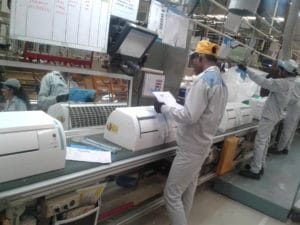
Well over half of the world’s electricity is consumed by the products addressed in these guides. Yet many developing and emerging economies are just starting to explore opportunities to transform their markets with energy-efficient products. A well-designed set of policies can greatly accelerate this transition, enabling them to leapfrog past outdated technologies to superior, cost-effective alternatives.
The aim is to give policymakers a basic understanding of technical, market and policy considerations so that they can enhance energy efficiency activities in their countries. The framing of each guide is based on United for Efficiency’s Integrated Policy Approach, which is being successfully applied around the world. The content was developed with insights from top experts in industry, civil society, academia and international organizations.
Paul Kellett, United for Efficiency Programme Manager, UN Environment, introduced United for Efficiency and shared key findings from the Fundamental Policies Guide (to be published in September 2017).
Rolf Smeets, Residential Lighting Director, Philips Lighting, shared key findings from the Lighting Policy Guide.
David Manrique, Sustainability Development Leader, Mabe, shared key findings from the Air Conditioners Policy Guide.
Nathan Mouw, Global Product Safety and Regulatory Affairs Senior Director, Whirlpool Corporation, shared key findings from the Refrigerators Policy Guide.
Ajit Advani, Sustainable Energy Advisor, International Copper Association, shared key findings from the Electric Motors and Motor Systems Policy Guide (to be published in August 2017).
Angelo Baggini, Professor of Electrical Engineering, University of Bergamo, shared key findings from the Transformers Policy Guide (to be published in September 2017).
Presentations were followed by an interactive question and answer session with the audience, guided by Giulia D’Angiolini, United for Efficiency – Energy Efficiency Expert, UN Environment.